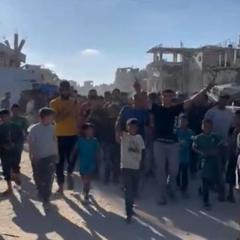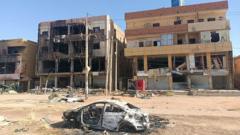After an extended two-month blockade, approximately 90 truckloads of essential supplies have begun to arrive in Gaza, marking a crucial first influx into the territory. This distribution comes at a time when the region faces an unprecedented humanitarian crisis exacerbated by ongoing conflict and shortages of vital resources.
Aid Reaches Gaza After Prolonged Blockade as Humanitarian Crisis Deepens

Aid Reaches Gaza After Prolonged Blockade as Humanitarian Crisis Deepens
The first significant shipment of humanitarian aid arrives in Gaza following months of delays and a harsh blockade imposed by Israel.
The United Nations confirmed that these deliveries, which include food and other necessities, are being received at strategic locations within Gaza. However, aid officials emphasize that the amount received so far is only a minor fraction of what is urgently required. “Desperately needed aid is finally trickling in—but the pace is far too slow. We need more aid trucks coming in daily,” voiced the World Food Program, highlighting the dire situation.
The Israeli government had maintained the blockade as a strategy to pressure the militant group Hamas into submission, claiming that the organization had misappropriated international aid intended for civilians. Nonetheless, such assertions remain hotly contested by global humanitarian organizations who stress the need for impartial aid distribution.
To facilitate aid flow, Israel indicated a willingness to allow some humanitarian deliveries under a familiar framework instead of a newly proposed system that would involve Israeli oversight. However, negotiations between Israel and the U.N. have been fraught with complications, leading to delays in aid distribution.
UN aid officials described the routes for aid delivery as potentially perilous, raising concerns about theft. In response, Israeli officials have expressed intentions to establish a more direct aid system in collaboration with international agencies.
In a recent press conference, Israeli Prime Minister Benjamin Netanyahu reiterated the government’s resolve to intensify military actions against Hamas if they do not accept terms set by Israel, stating that their ultimate goal is to establish complete security control in Gaza and defeat Hamas decisively.
As the world watches, the humanitarian situation in Gaza remains critical, leaving many to question the effectiveness and morality of the ongoing blockade and the broader conflict.
The Israeli government had maintained the blockade as a strategy to pressure the militant group Hamas into submission, claiming that the organization had misappropriated international aid intended for civilians. Nonetheless, such assertions remain hotly contested by global humanitarian organizations who stress the need for impartial aid distribution.
To facilitate aid flow, Israel indicated a willingness to allow some humanitarian deliveries under a familiar framework instead of a newly proposed system that would involve Israeli oversight. However, negotiations between Israel and the U.N. have been fraught with complications, leading to delays in aid distribution.
UN aid officials described the routes for aid delivery as potentially perilous, raising concerns about theft. In response, Israeli officials have expressed intentions to establish a more direct aid system in collaboration with international agencies.
In a recent press conference, Israeli Prime Minister Benjamin Netanyahu reiterated the government’s resolve to intensify military actions against Hamas if they do not accept terms set by Israel, stating that their ultimate goal is to establish complete security control in Gaza and defeat Hamas decisively.
As the world watches, the humanitarian situation in Gaza remains critical, leaving many to question the effectiveness and morality of the ongoing blockade and the broader conflict.





















